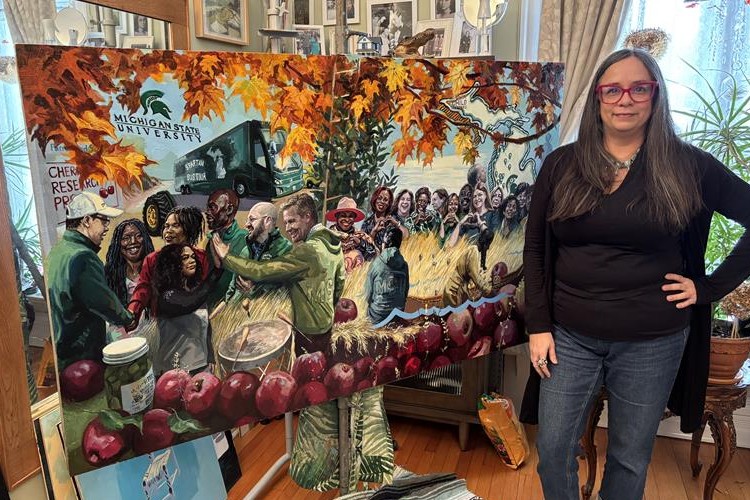Young Joon Kwak, the 2020-21 Artist-in-Residence of Critical Race Studies, is wrapping up their time at MSU, but the impact of their work on the community will live on through new dialogues about objecthood, bodies, and symbolism.
As part of the Critical Race Studies Residency, Kwak reimagined the Spartan Statue by creating cold-cast metal sculptures and prints based on silicone molds taken of fragments of the statue. These fragmentary sculptures and prints were displayed at the MSU Union Art Gallery April 9-May 21 as a part of Kwak’s Spartan Skin exhibition.

Spartan Skin allowed Kwak to reimagine the symbolic meaning of the statue and to catalyze a dialogue on how symbols represent different communities within institutions, and what kinds of bodies and communities get left out of that representation.
“The symbol of the Spartan signifies lots of different things, for lots of different people. At the same time, it also symbolizes ideals of masculine power, physical fitness, and the ascendency and domination of western civilization that carries so much weight and influence in the sports culture and the larger community of the university,” Kwak said. “I’m invested in questioning the prominent symbols of these raced and gendered exemplary bodies that are largely taken for granted, and opening them up to be more open-ended, transformational, and inclusive of diverse communities.”
I’m invested in questioning the prominent symbols of these raced and gendered exemplary bodies that are largely taken for granted, and opening them up to be more open-ended, transformational, and inclusive of diverse communities.
As part of the Critical Race Studies Residency, Kwak taught a course about objecthood and the performance of race, gender, and sexuality during the Fall 2020 semester and taught a course about casting bodies, which covered the politics surrounding bodies that are valorized and bodies that are forgotten, during the Spring 2021 semester. Both courses related to the theme of Kwak’s overarching Spartan Skin exhibit and allowed students to engage with Kwak’s work on a deeper level.
The Critical Race Studies Residency allowed Kwak to expand on their own artistic practices while engaging with the MSU community on a broader level. Kwak’s work is guided by their desire to counter the harmful effects of objectification, shaming, and violence enacted on differently abled/non-normative bodies in the world by taking seemingly impermeable symbols that essentialize ideals of raced and gendered physical fitness, like the Spartan Statue, and opening them up for further consideration.

“Critical Race Theory provides me with the analytical tools to understand and explore the symbols and the exemplary bodies that are in mass media and how the images that we encounter every day come to define our sense of self,” Kwak said. “As the artist-in-residence, I am proposing different ways of viewing and understanding how we’re forced into these oppressive categories and trying to imagine new futures, new bodies, and new identities.”
While the Critical Race Studies Residency program took a different format during the 2020-21 academic year due to the COVID pandemic, Kwak still made the most of their time at MSU.
As the artist-in-residence, I am proposing different ways of viewing and understanding how we’re forced into these oppressive categories and trying to imagine new futures, new bodies, and new identities.
“I most enjoyed working with individual students,” Kwak said. “I know I’ve made a difference within specific students and making them feel seen and heard and that their voices are valuable.”
The Critical Race Studies Artist-in-Residence program, offered by the Department of Art, Art History, and Design, was established in 2017 thanks to a $750,000 gift from the Michigan State University Federal Credit Union (MSUFCU).
For more information about Kwak, visit Young Joon Kwak’s website.


